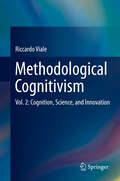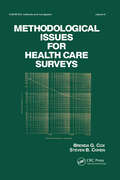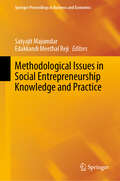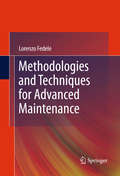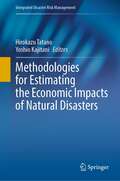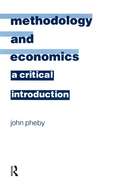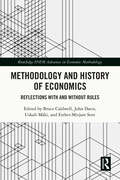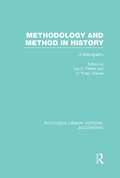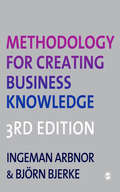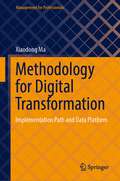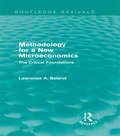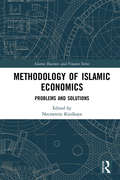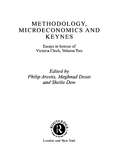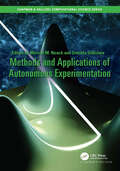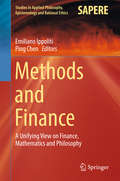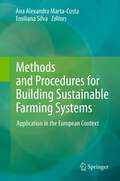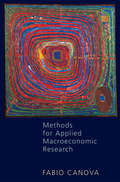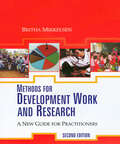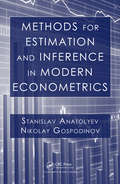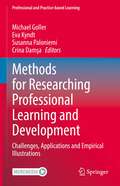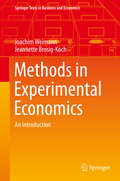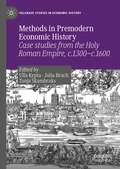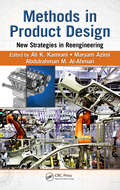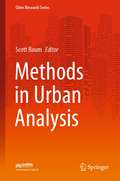- Table View
- List View
Methodological Cognitivism
by Riccardo VialeThis book deals with the cognitive foundation of the theory of social action. The social sciences are still guided by models of social action, far from the empirical reality of the psychology of action. While economics seems to have made greater progress in accepting the changes to the theory of action derived from cognitive science (see, for example, the 2002 Nobel prize for economics awarded to Daniel Kahneman), sociology is still being oriented on the dualism of hermeneutics vs. structuralism, which leaves very little room for a cognitive theory of social action. The unique features of the book are its combination of epistemology, philosophy of mind and cognitive science in order to renew and overcome the limits of the current methodologies of social science and in particular methodological individualism. Methodological cognitivism is proposed as an alternative to the holistic character of structuralism, to the intentionalist and rationalist features of methodological individualism, and to the relativistic character of hermeneutics and ethnomethodology.
Methodological Issues for Health Care Surveys (Statistics: A Series of Textbooks and Monographs)
by B. M. CoxThis book is written for professionals who wish to learn about methodological issues associated with health care surveys. It represents a distinct and important contribution to the application of the methodology of sample surveys to the collection of data on the utilization of health care services.
Methodological Issues in Social Entrepreneurship Knowledge and Practice (Springer Proceedings in Business and Economics)
by Satyajit Majumdar Edakkandi Meethal RejiThis book focuses on ‘research on research methodologies’ – an area rarely addressed in social entrepreneurship. Methodological debates are integral to the quest for knowledge and to advancing theories and practices in any field, and, as a multi-disciplinary and emerging field, social entrepreneurship cannot avoid such debates. Providing a fresh perspective on social entrepreneurship research, the book includes contributions from diverse disciplinary settings, e.g. sociology, psychology, social work, anthropology, public policy, economics and management, and discusses the ‘methodological challenges’ of practice as well as social entrepreneurship research. Rather than favouring any particular method or methodological approach, it acknowledges the diversity of methodological approaches needed to reveal the nuances of social entrepreneurship and promote new knowledge and practices in this promising field.
Methodologies and Techniques for Advanced Maintenance
by Lorenzo FedeleThe management of technical plants for productivity and safety is generally a complex activity, particularly when many plants in one territory are affected, quality guarantees and cost results are required, and the technology involved is heterogeneous and innovative. To enable readers to manage technical plants efficiently, despite the above complications, Methodologies and Techniques for Advanced Maintenance presents theories, methodologies and practical tools for the realization of an intelligent maintenance management system for distant monitoring. It also covers the development and running of a remote control center. The so-called granted availability management system (GrAMS) was conceived to enable organizations involved in technical-industrial plant management to move towards "well known availability" and "zero failures" management. In particular, Methodologies and Techniques for Advanced Maintenance deals with the diagnostic aspects and safety levels of technical plants (such as elevators, thermo-technical plants, etc.). The author also discusses the usage of ad hoc designed software analysis tools based on neural networks and reliability indicators. Methodologies and Techniques for Advanced Maintenance is a useful text for practitioners and researchers in maintenance and facilities. Its application spans industrial, plant, technological, infrastructure and civil fields.
Methodologies for Estimating the Economic Impacts of Natural Disasters (Integrated Disaster Risk Management)
by Hirokazu Tatano Yoshio KajitaniThis book outlines methodologies to estimate the economic impacts of natural disasters based on business surveys conducted after large disasters in Japan. By including numerous observations on business activities in past disasters and the validations of both engineering and economic models based on these data sets, this book appeals to practitioners who estimate the regional economic impacts as well as to students and young professionals in various fields who conduct disaster impact studies. The book consists of 7 chapters and includes theories and practices, which help readers to interlink the estimation methods with real-world problems. The study primarily focuses on cases in Japan, but the methods employed can be generalized and applied in other countries.
Methodology and Economics: A Critical Introduction
by John PhebyThe essays in this collection detail the fate of gypsies in the countries of Eastern Europe through the socialist era, and pay special attention to the experience of the Nazi holocaust. The volume includes essays on Czechoslovakia, Yugoslavia, Albania, Hungary and Romania.
Methodology and History of Economics: Reflections with and without Rules (Routledge INEM Advances in Economic Methodology)
by Bruce CaldwellThis edited volume provides an in-depth exploration into the influential work of Wade Hands, examining the changing relationship between methodology and the history of economics in connection with contemporary developments in economics. The papers in this volume fall into four parts, each devoted to an important theme in Wade Hands’ work. The first section explores the influence and scope of Reflection Without Rules, capturing the rich debate that the book generated about what guides methodological and philosophical thinking in economics. The second section examines Hands’ research on Paul Samuelson’s economics and the methodological dimensions of Samuelson’s thinking. Section three looks to Hands’ long-standing interest in the philosophical foundations of pragmatist thinking. The final section addresses his more recent research in the methodological import of the emergence of behavioural economics. Together, the contributors show how Hands’ insights in complexity theory, identity, and stratification are key to understanding a reconfigured economic methodology. They also reveal how his willingness to draw from multiple academic disciplines gives us a platform for interrogating mainstream economics and provides the basis for a humane yet scientific alternative. This unique volume will be essential reading for advanced students and researchers across social economics, history of economic thought, economic methodology, political economy and philosophy of social science.
Methodology and Method in History: A Bibliography (Routledge Library Editions: Accounting)
by Lee D. Parker O. Finley GravesThis bibliography provides the reader with a comprehensive reference tool that will enhance understanding of methodological issues and enable the user to employ research methods appropriate to their subject of study. It also provides accounting historians a comprehensive data base for the development of papers addressing methodological issues in an accounting history context. Access to this type of resource is particularly crucial to the development of accounting history research since the number of papers dealing with methodological issues published in accounting history literature is very small. Hence the references in this bibliography are drawn from the literature of general history, economic and business history, legal and social history and philosophy. The scope and range of its contents are broad – references are taken from texts as well as papers published in over 450 journals.
Methodology for Creating Business Knowledge (Third Edition)
by Ingeman Arbnor Bjorn Bjerke`Arbnor and Bjerke's deep insight into theory construction and their honest appraisal of knowledge creation makes this edition absolutely essential for business scholars. I recommend this book to scholars in any area of business seeking a more thoughtful and useful understanding of research methodology' - Morgan Miles, Professor of Marketing, Georgia Southern University `These are two authors on top of their game, using their vast experience and depth of knowledge to present a complex topic in a framework which is understandable and usable by anyone doing academic research. This third edition will ensure that this book remains the essential read for social science researchers' - David Carson, Professor of Marketing, University of Ulster Arbnor and Bjerke's best-selling text, first published in 1997, remains unrivalled; both in its contemporary relevance to research methodology, and in its coverage of the interplay between the philosophy of science, methodology and business. The authors make an in-depth examination into the circularity of knowledge and its foundations and analyze the repercussions for business, research and consulting. Where knowledge is a competitive necessity understanding its foundations is a necessity. The Third Edition has been updated to be even more relevant to the contemporary interests of business knowledge. Additional extras include: - Several more examples are included, plus previous examples have been updated - Improved illustrations and diagrams - Revised presentation makes the book easier to use - Useful summaries of the key points and concepts to aide accessibility - Points of reflection allow the reader to further their thinking on the topics - A glossary of terms - A teacher's manual which can be requested from the book's website
Methodology for Current Account and Exchange Rate Assessments
by Peter Isard G. Russell Kincaid Martin FetherstonA report from the International Monetary Fund.
Methodology for Digital Transformation: Implementation Path and Data Platform (Management for Professionals)
by Xiaodong MaThis book focuses on why and how to achieve digital transformation for enterprises and organizations by introducing cases in China. Its purpose is to highlight the importance and improve the understanding for digital transformation and related issues, like human resource allocation, and how to improve the efficiency and success rate in a low-cost and low-risk way. In this way, the cases in the book avoid the most common traps during the digital transformation process, enabling R&D and business personnel, and data practitioners in the organization to figure out the implementation and processes involved, and hence better understand how to work with senior management team when implementing the transition plan. The middle and senior level managers such as company executives, presidents in banks and universities, and officials in government, are also the target audience.
Methodology for a New Microeconomics: The Critical Foundations (Routledge Revivals)
by Lawrence A. BolandFirst published in 1986, this title argues that the successful development of a new microeconomics requires a deeper understanding of methodological individualism and its role in stability analysis. Lawrence Boland expounds a critique of neoclassical models, which, he contends, often fail to include an explicit stability analysis. He demonstrates that much of the sophisticated theoretical literature over the past thirty years can be understood as ad hoc attempts to overcome the deficiencies of such models in the absence of cogent stability analyses. In conclusion, he explains the need to update the theory taught at universities, and to develop a truly individualist version of microeconomics that is consistent with the methodological principles of major neoclassical models. An important contribution to economic methodology, this work is a highly valuable resource for all students and teachers of economics at the undergraduate level.
Methodology of Islamic Economics: Problems and Solutions (Islamic Business and Finance Series)
by Necmettin KizilkayaIn its pursuit to equip the reader with a basic knowledge of Islamic economics, this book divulges the micro-foundations of the discipline, and highlights the predominant schools of thought that exist in the field. It explains, in simple terms, what Islamic economics entails and how it can be studied as a science in relation to the Holy Quran, the Sunnah and the Islamic intellectual tradition based on these two sources. The book familiarizes the reader with knowledge of the basic maxims of the discipline. It then establishes the arguments that are presented by the proponents of religion-based economics, specifically Islam, and apprises readers about the aforementioned schools as they exist. A number of chapters consider the dimension of the dilemmas the discipline is facing, and the chronological progress of the field is reviewed, hence providing a comprehensive overview of the topic. The book deals with the issues about the origins of Islamic economics, the basic methodological questions, the use of the opportunities offered by fiqh in the methodological discussions and the main problems arising from the encounter with other cultures and civilizations. It offers practical solutions, despite the differing schools of thought, not unlike the development of conventional Economics where radical differences between Keynesian, Classical and Monetarist approaches existed. It concludes by incorporating some of the finest works that explain to the reader how Islamic economics may progress as a discipline. This guide will provide both students and researchers in Comparative Economic Studies, Islamic Economics and Islamic Finance with an essential overview of the field.
Methodology, Microeconomics and Keynes: Essays in Honour of Victoria Chick, Volume 2
by Meghnad Desai Philip Arestis Sheila DowThis volume, a companion to Money, Macroeconomics and Keynes, represents both consolidation and the breaking of new ground in Keynesian methodology and microeconomics by leading figures in these fields.
Methods and Applications of Autonomous Experimentation (Chapman & Hall/CRC Computational Science)
by Daniela Ushizima Marcus M. NoackAutonomous Experimentation is poised to revolutionize scientific experiments at advanced experimental facilities. Whereas previously, human experimenters were burdened with the laborious task of overseeing each measurement, recent advances in mathematics, machine learning and algorithms have alleviated this burden by enabling automated and intelligent decision-making, minimizing the need for human interference. Illustrating theoretical foundations and incorporating practitioners’ first-hand experiences, this book is a practical guide to successful Autonomous Experimentation. Despite the field’s growing potential, there exists numerous myths and misconceptions surrounding Autonomous Experimentation. Combining insights from theorists, machine-learning engineers and applied scientists, this book aims to lay the foundation for future research and widespread adoption within the scientific community. This book is particularly useful for members of the scientific community looking to improve their research methods but also contains additional insights for students and industry professionals interested in the future of the field.
Methods and Finance
by Emiliano Ippoliti Ping ChenThe book offers an interdisciplinary perspective on finance, with a special focus on stock markets. It presents new methodologies for analyzing stock markets' behavior and discusses theories and methods of finance from different angles, such as the mathematical, physical and philosophical ones. The book, which aims at philosophers and economists alike, represents a rare yet important attempt to unify the externalist with the internalist conceptions of finance.
Methods and Procedures for Building Sustainable Farming Systems: Application in the European Context
by Emiliana L. D. G. Soares da Silva Ana Alexandra Marta-CostaShowing how the method of sustainability assessment plays a key role in choosing the best agricultural productive mode, this book guides the reader through the process of selecting, from among the various approaches for building farming systems, the method of decision-making that will result in the most appropriate outcome, given the context. Case studies hail from polities as diverse as Portugal and Canada, Argentina and Lebanon. The work thus offers a valuable critical survey of the assessment methods that account for sustainability and economics, and which have developed considerably in the last two decades. The heterogeneous approaches covered here make this volume appropriate for consultation in a wide variety of social, political and geographical contexts.
Methods for Applied Macroeconomic Research
by Fabio CanovaThe last twenty years have witnessed tremendous advances in the mathematical, statistical, and computational tools available to applied macroeconomists. This rapidly evolving field has redefined how researchers test models and validate theories. Yet until now there has been no textbook that unites the latest methods and bridges the divide between theoretical and applied work. Fabio Canova brings together dynamic equilibrium theory, data analysis, and advanced econometric and computational methods to provide the first comprehensive set of techniques for use by academic economists as well as professional macroeconomists in banking and finance, industry, and government. This graduate-level textbook is for readers knowledgeable in modern macroeconomic theory, econometrics, and computational programming using RATS, MATLAB, or Gauss. Inevitably a modern treatment of such a complex topic requires a quantitative perspective, a solid dynamic theory background, and the development of empirical and numerical methods--which is where Canova's book differs from typical graduate textbooks in macroeconomics and econometrics. Rather than list a series of estimators and their properties, Canova starts from a class of DSGE models, finds an approximate linear representation for the decision rules, and describes methods needed to estimate their parameters, examining their fit to the data. The book is complete with numerous examples and exercises. Today's economic analysts need a strong foundation in both theory and application. Methods for Applied Macroeconomic Research offers the essential tools for the next generation of macroeconomists.
Methods for Development Work and Research: A New Guide for Practitioners
by Britha Helene MikkelsenPraise for the First Edition: `It is a guide of vital importance to researchers, trainers and extension workers, especially those collaborating with communities in developing countries′ - European Journal of Development Research `There is much of value here that even experienced development workers might learn from…. Mikkelsen offers many insights that would be valuable to any economist undertaking field work in development′ - The Australian Journal of Agricultural Economics `An enthusiastic, vibrant supplement to methodology texts…. The formulation is concise, comprehensive, yet substantial′ - Business Line `Development researchers will be grateful to Mikkelsen for her laudable job in competently assessing their needs…. She provides an overview of the traditional and the new techniques and tools for field study′ - Deccan Herald This completely revised version of the successful 1995 text covers a wide range of issues relating to research concepts and methods. It incorporates new lessons that have been learned regarding the merits and pitfalls of development work. Reflecting on how and why research in international development work has become a special case within the social sciences, this book provides innovative examples of participatory methods in action; methodological guidance on linking research purpose, questions and methods in qualitative and quantitative research; highlights new methods for development work and research like the Rights-based Approach, Appreciative Inquiry, the Social Capital Analysis Tool and Geomatics; emphasizes the gender perspective in development work; and discusses ethics, regulations and codes of conduct, as well as the question of encounters with `other` cultures.
Methods for Estimation and Inference in Modern Econometrics
by Stanislav Anatolyev Nikolay GospodinovThis book covers important topics in econometrics. It discusses methods for efficient estimation in models defined by unconditional and conditional moment restrictions, inference in misspecified models, generalized empirical likelihood estimators, and alternative asymptotic approximations. The first chapter provides a general overview of established nonparametric and parametric approaches to estimation and conventional frameworks for statistical inference. The next several chapters focus on the estimation of models based on moment restrictions implied by economic theory. The final chapters cover nonconventional asymptotic tools that lead to improved finite-sample inference.
Methods for Researching Professional Learning and Development: Challenges, Applications and Empirical Illustrations (Professional and Practice-based Learning #33)
by Eva Kyndt Michael Goller Susanna Paloniemi Crina DamşaThis volume provides alternatives for tackling existing empirical, methodological, and analytical challenges. It does so by providing a broad overview of less established, as well as emerging methods, which are of great relevance for current research on professional learning and development. As such, it offers a comprehensive collection of state-of-the-art methodologies and future directions within the workplace learning and professional development research. By describing these novel approaches and providing empirical illustrations, the book promotes innovative methodologies for investigating professional learning and development. It also supports scholars to understand upcoming empirical research and methods and encourages novice as well as established researchers to adopt new empirical strategies beyond traditional ones that have the potential to enrich a better understanding of professional learning and development.
Methods in Experimental Economics: An Introduction (Springer Texts in Business and Economics)
by Joachim Weimann Jeannette Brosig-KochThis textbook provides a hands-on and intuitive overview of the methodological foundations of experimental economics. Experimental economic research has been an integral part of economic science for quite some time and is gaining more and more attention in related disciplines. The book addresses the design and execution of experiments, the evaluation of experimental data and the equipment of an experimental laboratory. It illustrates the challenges involved in designing and conducting experiments and helps the reader to address them in practice.
Methods in Premodern Economic History: Case studies from the Holy Roman Empire, c.1300-c.1600 (Palgrave Studies in Economic History)
by Ulla Kypta Julia Bruch Tanja SkambraksThis edited collection demonstrates how economic history can be analysed using both quantitative and qualitative methods, connecting statistical research with the social, cultural and psychological aspects of history. With their focus on the time between the end of the commercial revolution and the Black Death (c. 1300), and the Thirty Years’ War (c. 1600), Kypta et al. redress a significant lack of published work regarding economic history methodology in the premodern period. Case studies stem from the Holy Roman Empire, one of the most important economic regions in premodern times, and reconnect the German premodern economic history approach with the grand narratives that have been developed mainly for Western European regions. Methodological approaches stemming from economics as well as from sociology and cultural studies show how multifaceted research in economic history can be, and how it might accordingly offer us new insights into premodern economies.
Methods in Product Design: New Strategies in Reengineering
by Ali K. Kamrani Abdulrahman M. Al-Ahmari Maryam AzimiAs industries adopt consumer-focused product development strategies, they should offer broader product ranges in shorter design times and the processes that can manufacture in arbitrary lot sizes. In addition, they would need to apply state-of-the-art methods and tools to easily conduct early product design and development trade-off analysis among competing objectives. Methods in Product Design: New Strategies in Reengineering supplies insights into the methods and techniques that enable implementing a consumer-focused product design philosophy by integrating design and development capabilities with intelligent computer-based systems. The book defines customer focused design and discusses ways to assess changing demands and sources, and delves into what is needed to successfully manufacture goods in a demanding market. It reviews proven methods for assessing customer need. Then, after showing how changing needs impact the reengineering of products, it explains how change can be efficiently achieved. It details how IT advances and technology support customer-focused product development, discusses cutting-edge mass customization principles that maximize cost-effective production, and illustrates how to implement effective predictive maintenance policies.Methods in Product Design: New Strategies in Reengineering provides methods, state-of-the-art technologies, and new strategies for customer-focused product design and development that allow organizations to quickly respond to the demanding global marketplace.
Methods in Urban Analysis (Cities Research Series)
by Scott BaumThis book highlights major quantitative and qualitative methods and approaches used in the field of urban analysis. The respective chapters cover the background and relevance of various approaches to urban studies and offer guidance on implementing specific methodologies. Each chapter also provides links to real-world examples. The book is unique in its focus on Australian examples and subject matter, presented by recognized experts in the field.
